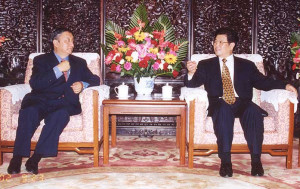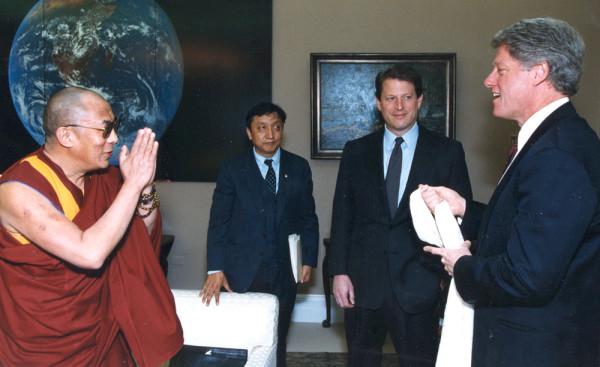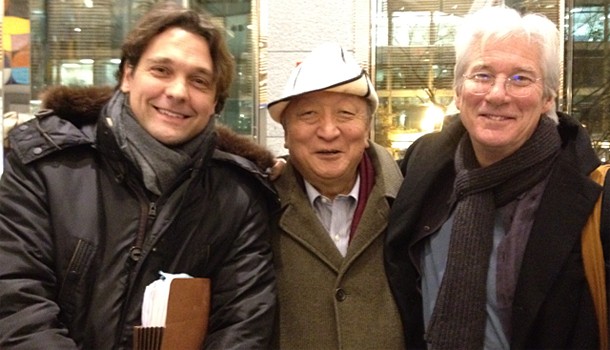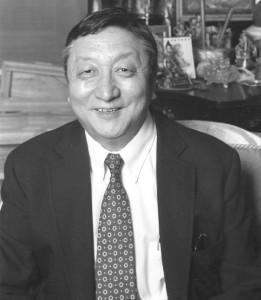As Lodi Gyaltsen Gyari, the Dalai Lama’s “man in Washington”, steps down from the International Campaign for Tibet (ICT) – an American non government organisation which promotes human rights and democratic freedoms for the people of Tibet – he has taken the time to reflect on his work, celebrate his accomplishments and offer thanks to those who have helped him along the way.
The Dalai Lama’s special envoy in the United States, Lodi Gyaltsen Gyari started his American role in the 1990s when Tibet was an “obscure” issue. Not allowed in the State Department or White House building, Gyari had to hold his meetings with figures in the Administration in coffee shops and tea rooms. Yet slowly but surely he has raised the profile of the Dalai Lama and the Tibetan cause within the American government.
With support from the ICT, Gyari was instrumental in arranging meetings between the Dalai Lama and America’s figures of influence including George W Bush in 1991, the Dalia Lama’s first meeting with an American president. He secured subsequent meetings for His Holiness with Bill Clinton, Barack Obama, the Secretary of State and National Security Advisor. President Bush committed to making dialogue between Tibet and China a key objective of his administration’s policy and warned that a lack of resolution to the Tibetan problem could cause difficulties for fuller political economic engagement between the United States and China. In 2007 George Bush awarded the Dalai Lama the Congressional Medal of Honour, the highest expression for distinguished achievements.
His approach is described by Congressmen as,” very humble, quiet, very persistent, but … never threatening”
In the ICT, Gyari has served as board member, President and Executive Chairman. In his memoir, he says “we focused on moving forward the agenda of His Holiness the Dalai Lama and the people of Tibet.” He has been instrumental in increasing the membership of the ICT from less than one hundred to almost 100,000 people today.
He once described his role as a “regular layperson, doing mundane things like running around trying to meet with people”, but nevertheless made significant contributions to the Tibetan cause. He says, “The suffering and perseverance embodied in the Tibetan people’s recent history has moved some of the most powerful people in the world, enriching their understanding of the strength of the human spirit. Bringing these experiences to the attention of influential policy makers and being a part of developing a coherent, international response has brought me great professional satisfaction and personal joy.”

Lodi Gyari with Wang Zhaoguo, head of the
Central United Front Work Department of the
Chinese Communist Party in September, 2002
Photo: ICT
A former journalist and skilled diplomat, at 30 years old he was one of the youngest people to serve in the Tibetan administration as a senior elected official. Internationally, he is trusted, consulted and admired by many world leaders and members of diplomatic corps. In 2002, was chosen to lead the negotiations between representatives of the Chinese government and representatives of the Dalai Lama.
Advocating autonomy for Tibetans within China, rather than separation, his outlook has been different from that of some of his close family. Gyari he is the child of a legendary Tibetan freedom fighter who was one of the first Tibetans to fight against the Chinese in the 1950s.
Tibetans refer to Lodi Gyari as “Gyari Rinpoche”, a name which reflects his religious background. He is believed to be the reincarnation of a senior Buddhist lama and had an upbringing in the monastic system. Though he swapped robes for suits, he has maintained a deep devotion to Buddhist traditions and a close relationship with his Buddhist masters. His son is studying to become a monk in India.
Gyari has published his reflective memoir “My personal words of gratitude” on the ICT website. In it he comments, “infusing hope and encouragement to the Tibetan people inside Tibet is more important than anything else.”
Gyari now splits his time between India and the US, since his retirement able to spend more time with his wife, six children and many grandchildren. Where does he feel most at home? He says, “I am a proud Tibetan-American with deep appreciation for the principles and values that this nation stands for. Nevertheless it is a sad thing even at this stage of my life that I do not have a place to call ‘home’. I can never retire from being a Tibetan for as long as I live.”







 Print
Print Email
Email